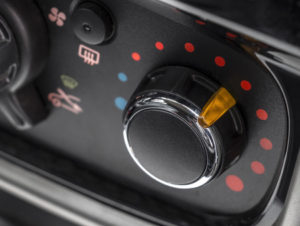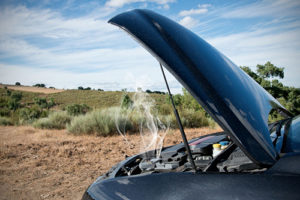What should you do when your car overheats? There are five simple steps to do when you see the temperature gauge rising:
- Don’t panic.
- Turn off the AC
- Turn on the heater on full blast.
- Find a safe space to stop.
- Check the issue.
Following these steps can definitely turn a supposed nightmare into a “Whew!” Now, let’s talk about each step in detail.
What Should You Do When Your Car Overheats?
1. Don’t panic
 Once you see the temperature gauge rising, don’t panic. One thing to note is that the car won’t explode. Panicking might cause you to make erratic decisions and this can be quite problematic, especially when you are on a highway. Just relax and monitor the rise. Is it rising to fast? Is the rise slow but steady? After you have composed yourself, follow the steps below.
Once you see the temperature gauge rising, don’t panic. One thing to note is that the car won’t explode. Panicking might cause you to make erratic decisions and this can be quite problematic, especially when you are on a highway. Just relax and monitor the rise. Is it rising to fast? Is the rise slow but steady? After you have composed yourself, follow the steps below.
Note: The following tips assume that your car is overheating while on a long drive. Some of the tips mentioned below might not be applicable on certain situations such as an overheating car within the city.
2. Turn the AC off
While your passengers might not agree with you in this, especially under the summer heat, the first thing you should do is to turn the AC off. The AC puts an incredible strain on your engine and can often expedite the whole overheating process. So roll down the windows and enjoy the fresh air.
3. Turn the heater on full blast
 After you turn the AC off, you should see the temperature gauge either going down or at least the rise is slowed down. To further help your engine out, turn on the heater on full blast.
After you turn the AC off, you should see the temperature gauge either going down or at least the rise is slowed down. To further help your engine out, turn on the heater on full blast.
Don’t worry, if you have the windows down you probably won’t even feel the hot air. Turning on the blower takes any hot air from under the hood helping it cool down the engine faster.
4. Find a safe place to stop
While steps 2 and 3 are not solutions, this can help you run a few more miles to get to a safe place to stop. A car that is overheating has some issues and you need to address them. The car engine needs at least 30 minutes to cool down. So if you find a nice place where you can sit down and eat then just chill and wait for your car to cool down.
5. Check the issue
 The first thing you need to check as soon as the car has cooled down is the radiator. Open the cap and see if there is enough coolant in there. If you think the radiator is empty you should go and top it off. Now, not everyone has the proactiveness needed to consider carrying a gallon of coolant in the car so adding water is a good alternative. Try to turn the ignition key and turn on the AC, all the fans should be running. If you spot one fan that’s not running that could be the problem.
The first thing you need to check as soon as the car has cooled down is the radiator. Open the cap and see if there is enough coolant in there. If you think the radiator is empty you should go and top it off. Now, not everyone has the proactiveness needed to consider carrying a gallon of coolant in the car so adding water is a good alternative. Try to turn the ignition key and turn on the AC, all the fans should be running. If you spot one fan that’s not running that could be the problem.
While the car is still running, turn the AC off if both fans power down. In cases wherein the fans are the problem, it is best to call an expert to check it out for you. However, if your destination is only a few kilometers away, you can probably make a run for it as long as the AC is off and the heater is on.
Why Does A Car Overheat?
Inside the hood of your car is the engine. Now this engine is one mechanical marvel that allows the car to do what it does. However, it’s basically metal moving against metal. This causes friction and where there’s friction there’s also heat. This heat can rise up pretty fast. There are a lot of ways to prevent your engine from heating up if you see your car overheating then 9 times out of 10 it’s because there is something wrong with your engine cooling system.
The engine cooling system consists of the radiator, fans, a pump, a tank, and a series of hoses that ensures the coolant is circulated in and around the car engine. The coolant helps carry heat away from the engine and takes it to the radiator where the heat dissipates. When your car overheats, it’s most likely caused by a problem in the cooling system. You may not have enough coolant (because of negligence or a leak), your radiator is clogged, or your fan is not working.
What Should You Do When Your Car Overheats? Visit T3 Atlanta!
If you have overheating issues with your Nissan, Lexus, Infiniti, or Toyota, then bring your car to T3 Atlanta. With years of experience in the job, we can quickly identify the problem and provide you with the best solution. Call us today so you can ensure your next drive is headache free.










Leave a Reply
You must be logged in to post a comment.